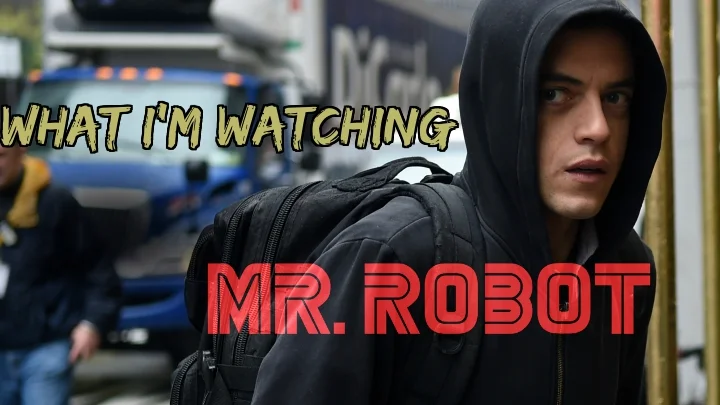What I'm Watching: "Mr. Robot"
Slogging through this year’s crop of fall broadcast pilots, it’s impossible not to feel disenchanted with television as an artistic form. For the most part, these latest offerings are largely devoid of creativity or ingenuity: it’s almost as though they’ve been constructed from leftover pieces of a factory assembly line. Considering that the broadcasters are waging a war on multiple fronts — now battling against and cable and streaming platforms — it’s a depressing state of affairs to see how dull most of these projects are. (There are, of course, some exceptions to that statement.) Forget about the winter of our discontent — autumn is looking pretty insipid.
Thank god then for USA’s Mr. Robot.
USA dramas have largely tended to be of a similar ilk: blue sky programming with double-entendre-laden titles that often make for sunny, easy viewing. But lately, the cable network has strayed into darker climes. With hacker drama Mr. Robot — which wraps up its first season later this month — USA has perhaps entered a territory of peak bleakness and reached a creative apex, one that is on par with the very best programs currently on television. (Hell, even Mad Men creator Matthew Weiner recently acknowledged that he was hooked on Mr. Robot.)
Created by Sam Esmail, Mr. Robot might just be the most dangerous unpredictable show to come along in a while, a keenly twisted morality play for the digital age. The show revolves around a group of hackers doing their best to wreak tech-spawned anarchy at a time of unprecedented cyber attacks and identity theft in the US. Elliot Alderson (Rami Malek), a damaged and paranoid cyber security engineer, finds himself recruited by the enigmatic Mr. Robot (Christian Slater) to join a team of talented hackers known as fsociety. (MINOR SPOILERS AHEAD!)
Rami Malek and Christian Slater. USA
The hackers’ target: monolithic multinational E Corp, a blend of Google, Apple, and the worst elements of corporate malfeasance, that is referred to by Elliot as Evil Corp., a codename that, like a hacker’s toolkit, infects everything it touches.
Elliot is in the unenviable position of defending the company responsible for his father’s death in order to protect their bottom line. He’s paid to protect Evil Corp in his day job, working alongside his best friend Angela (Portia Doubleday) at an IT security firm. Worse still, Elliot, who suffers from social anxiety disorder, is addicted to morphine, which he uses in order to dull his fraught emotions. He speaks to the audience via an internal monologue with the imaginary friend he has created in his mind. Brilliant but deeply delusional, Elliot makes for an extremely unreliable narrator — and that’s where Mr. Robot truly begins to shine as it plays with notions of perception, reality, and fantasy.
Many viewers suspected that Mr. Robot was a figment of Elliot’s imagination, a version of Fight Club’s Tyler Durden, a theory that was thankfully proven to be a red herring. Instead, the truth of Mr. Robot’s identity, revealed in the show’s Aug. 12 episode, is even more troubling, particularly in light of the conflicting menace and charm Slater’s character has demonstrated towards Elliot since the show began.
Like Elliot and Mr. Robot, the show’s characters exist in a perpetual moral twilight, committing bad deeds in order to achieve specific ends that are either for anarchy or personal gain. Surly fsociety hacker Darlene (Carly Chaiken) steals scenes with her deadpan delivery and lack of personal boundaries, but she cares about Elliot deeply. Evil Corp’s interim CTO, Tyrell Wellick (Martin Wallström), a conniving social climber who engages in BDSM with his heavily pregnant Lady Macbeth-like wife (Stephanie Corneliussen), pays homeless people to beat them up in order to vent his anger, and seduces the CEO’s male assistant in order to hack his phone.
Martin Wallström. USA
Wellick wants to get ahead at any cost, a force of nature in a world of circuit boards. He’s all raging emotion to Elliot’s cold, clinical logic. The two seem bound together by fate, locked in an inexorable collision course with one another.
Just what the season’s end game is remains tantalizingly unclear and the show continues to tunnel down the rabbit hole each week. Mr. Robot excels at infecting the viewer with the characters’ paranoia, resulting in a taut thriller that is impossible to predict. In an era of Big Twist Television, Esmail’s Mr. Robot is a deeply intelligent drama that pulses with possibility. This is a show that makes you believe in the medium again: populated by complex characters fighting their inner demons, whiplash-inducing plot twists, and a gorgeous use of music to heighten the innate tension.
Malek and Wallström are at the top of their respective games, each delivering a staggering performance that pushes the two men well past the point of breaking for ordinary mortals. As the titular character, Slater exudes an unpredictable danger that encapsulates the essence of the show itself.
Mr. Robot can be viewed as a high-stakes suspense thriller about coding and corporate greed, but at its pulsing heart, it’s also a heartbreaking tragedy about identity and memory. Ultimately, this is a dark drama that embodies the risks that television needs to be willing to take in order to achieve true greatness — and a reminder that there’s still potential for the medium to surprise me.
Mr. Robot airs Wednesday at 10 p.m. on USA.
Carly Chaiken. USA




